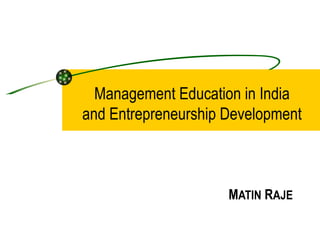Management education in india and entrepreneurship development
- 1. Management Education in India and Entrepreneurship Development M ATIN R AJE
- 2. Outline Entrepreneurship defined The MBA environment in India Critical Areas and Problems Lessons Learned
- 3. Entrepreneurship Defined ŌĆ£ Entrepreneurship is the practice of starting new organizations , particularly new businesses generally in response to identified opportunitiesŌĆØ ŌĆ£ Willingness to take the risks involved in starting and managing a businessŌĆØ ŌĆ£ The entrepreneur recognizes and acts upon market opportunitiesŌĆØ
- 4. Successful Entrepreneurs Driving force of an enterprise Enthusiastic vision , promoted with passion Recognize path to vision is flexible, fluid and will continually evolve Prudent risk takers Persuade and inspire others to buy into the vision Usually positive thinkers and strong decision makers See the big picture and connect dots in ways that others canŌĆÖt/donŌĆÖt Open to feedback ŌĆō no such thing as ŌĆ£bad feedbackŌĆØ Thrive on opportunities and threats
- 5. The ŌĆ£entrepreneurialŌĆØ MBA environment in India ŌĆ£ Opens your mindŌĆØ - broad, strategic, out of the box thinking Rigor - question everything, accept nothing, probe deeply Global mindset and connections Importance of networking Teamwork Leadership Step outside your ŌĆ£comfort zoneŌĆØ - continuous change Dealing with pressure Surrounded by highly driven, ambitious people
- 6. What to watch out for ŌĆ£ Analysis paralysisŌĆØ Perfect or perfect enough? Over emphasis on branding and prestige Herd mentality Realistic or unrealistic expectations? Are you doing an MBA for the right reasons Applying just enough or too much structure and rigor? Can entrepreneurship be taught ?
- 7. The MBA Advantage Leadership Development and Organizations Accounting ŌĆō Managerial & Financial Finance & Capital Markets Operations Microeconomics Decision Models Statistics Marketing Strategy International Economies & Macroeconomics
- 8. Example: Finance and Accounting Basics extremely important on running a company Income statement, balance sheet, cash-flow How different types of financing can be used to your strategic advantage Debt / equity ratios etc. High leverage ŌĆō high risk / Low leverage ŌĆō low risk Valuations!
- 9. The MBA cohort experience Principal benefit is your peer group Encourages discussion and issues in entrepreneurship Culture of risk-taking Someone who you can look to for advice (perhaps for the rest of your career / life) Top schools have excellent faculty to act as mentors Several top schools want to encourage entrepreneurship ŌĆō have venture funds of their own
- 10. Entrepreneurship education in India Entrepreneurship training centres Entrepreneurship education in management and technical institutions Pedagogical Choices Case Studies Business Plans Mentoring Entrepreneur lectures Projects Conceptual Lectures Incubator Cells, Student Clubs and Promotional Activities
- 11. Critical Factors Faculty Availability Expertise and need for capacity building Risk taking and Forward thinking capability of students Conducive Environment ŌĆō Financial, Political, Economical and Social
- 12. Problems faced Absence of faculty awareness, opportunities, and interest Lack of skills and knowledge in interested faculty Need for an effort to create interest in faculty and to develop the skills and knowledge needed to teach entrepreneurship
- 13. Lessons Learned Can entrepreneurship be taught? Successful entrepreneurs are driven, passionate and committed to begin with ŌĆō however, the MBA can help them raise their game even higher, if applied correctly MBA environments can nurture risk taking (It is the last time you can afford to take a risk and ŌĆ£ fail safelyŌĆØ) Strongest contributions of Management Education Core business skills Leadership Teamwork Ability to connect the dots (ŌĆ£go where the puck is going to beŌĆØ) Networks
- 14. Lessons Learned Major problems faced in India are Faculty availability and their expertise level Genuine interest on the part of Students Environmental factors
- 15. THANKS Real question to ask is not ŌĆ£ Is an MBA needed to become an entrepreneur ? (No), but ŌĆ£ can the MBA help you become a better entrepreneur ? (Yes, absolutely)














